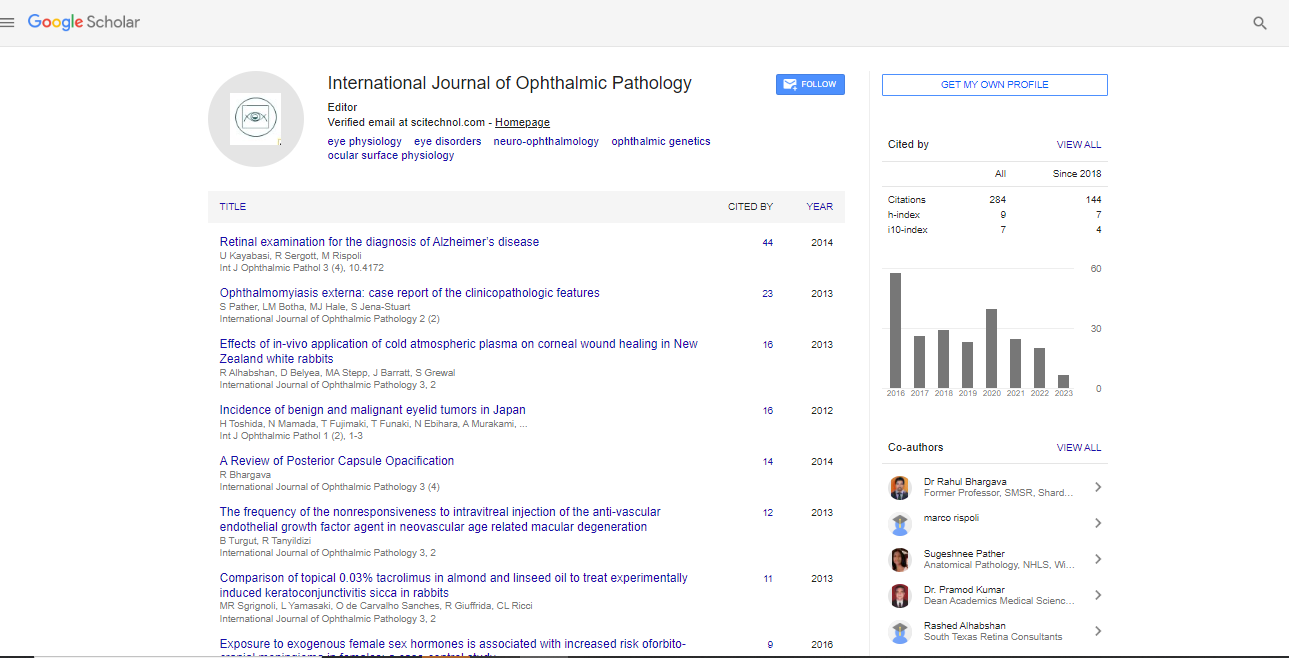Opinion Article, Int J Ophthalmic Pathol Vol: 12 Issue: 3
Treatment of Neurological and Visual Disorders with Neuro-Ophthalmology
Amor Laaury*
1Department of Ophthalmology, University of Ottawa Eye Institute, Ottawa, Canada
*Corresponding Author: Amor Laaury,
Department of Ophthalmology, University
of Ottawa Eye Institute, Ottawa, Canada
E-mail: amlaa@uoei.ca
Received date: 20 June, 2023, Manuscript No. IOPJ-23-104138;
Editor assigned date: 23 June, 2023, PreQC No. IOPJ-23-104138 (PQ);
Reviewed date: 07 July, 2023, QC No. IOPJ-23-104138;
Revised date: 14 July, 2023, Manuscript No. IOPJ-23-104138 (R);
Published date: 21 July, 2023, DOI: 10.4172/2324-8599.12.3.027
Citation: Laaury A (2023) Treatment of Neurological and Visual Disorders with Neuro-Ophthalmology. Int J Ophthalmic Pathol 12:3.
Description
Neuro-Ophthalmology is a specialized field that focuses on the diagnosis and management of neurological and visual disorders that affect the visual system. It combines expertise from both neurology and ophthalmology to provide comprehensive care for patients with conditions ranging from optic nerve disorders to visual processing abnormalities. By understanding the underlying neurological mechanisms behind visual dysfunction, neuro-ophthalmologists plays a vital role in the treatment of these complex disorders, aiming to improve visual function and enhance the overall quality of life for affected individuals.
One of the primary responsibilities of a neuro-ophthalmologist is to accurately diagnose neurological and visual disorders that impact the visual system. These disorders may include optic nerve diseases, such as optic neuritis and optic neuropathy, as well as visual pathway lesions, like tumors or demyelinating diseases. By conducting a comprehensive evaluation that combines detailed medical history, clinical examination and specialized diagnostic tests, neuroophthalmologists can identify the underlying causes of visual dysfunction and develop an appropriate treatment plan.
Optic nerve disorders, such as optic neuritis and ischemic optic neuropathy, require specific management strategies to preserve or restore vision. Neuro-ophthalmologists employ various treatment modalities, including corticosteroids, immunosuppressive agents and neuroprotective agents, to reduce inflammation, promote nerve cell survival and improve visual outcomes. Early intervention and close monitoring are important in optimizing treatment response and minimizing long-term visual impairment.
In addition to optic nerve disorders, neuro-ophthalmologists also specialize in diagnosing and managing visual processing abnormalities that arise from neurological conditions. Conditions like stroke, multiple sclerosis and brain tumors can affect the visual pathways and result in visual field defects, visual hallucinations, or other visual perceptual disturbances. Neuro-ophthalmologists work closely with neurologists and other specialists to develop individualized treatment plans that may include medication, visual rehabilitation, or surgical interventions to optimize visual function and alleviate visual symptoms.
Neuro-ophthalmology requires a multidisciplinary approach, as many neurological and visual disorders involve overlapping symptoms and require expertise from various medical disciplines. Neuroophthalmologists collaborate with neurologists, neurosurgeons, ophthalmologists, radiologists and other specialists to ensure comprehensive care for their patients. This collaborative approach enables a holistic assessment of the patient's condition and facilitates the development of targeted treatment strategies tailored to their specific needs.
The ultimate goal of neuro-ophthalmology is to optimize visual function and improve the quality of life for individuals with neurological and visual disorders. By accurately diagnosing and managing these conditions, neuro-ophthalmologists aim to preserve or restore visual acuity, visual field and visual perception. This, in turn, enhances the individual's ability to perform daily activities, maintain independence and engage in social interactions. Neuroophthalmologists also provide education and support to patients and their families, empowering them to cope with the challenges posed by their condition and make informed decisions regarding their eye health and overall well-being.
Advancements in imaging technology, such as Optical Coherence Tomography (OCT) and Magnetic Resonance Imaging (MRI), have revolutionized the field of neuro-ophthalmology, enabling more accurate and detailed assessments of the visual pathways and related structures. Additionally, ongoing analysis in neuro-ophthalmology aims to uncover the underlying mechanisms of various neurological and visual disorders, leading to the development of novel treatment approaches and interventions.
Conclusion
Neuro-ophthalmology plays a vital role in the diagnosis and management of neurological and visual disorders that affect the visual system. By combining expertise from neurology and ophthalmology, neuro-ophthalmologists provide specialized care to optimize visual function and improve the quality of life for individuals with these complex conditions. Through accurate diagnosis, targeted treatment strategies and collaboration with other specialties, neuro-ophthalmologists strive to enhance visual outcomes, empower patients and advance the field of neuro-ophthalmology for the benefit of those affected by neurological and visual disorders.
 Spanish
Spanish  Chinese
Chinese  Russian
Russian  German
German  French
French  Japanese
Japanese  Portuguese
Portuguese  Hindi
Hindi 